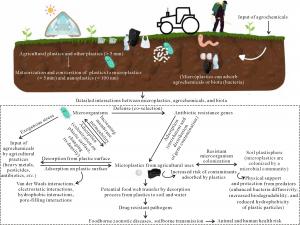Microplastics: hidden carriers of antibiotic resistance in agricultural soils
GA, UNITED STATES, July 1, 2025 /EINPresswire.com/ -- Microplastics, tiny plastic particles increasingly found in agricultural soils, are raising alarms for their role in spreading antibiotic resistance. These pollutants, commonly introduced by agricultural practices, are more than just an environmental issue—they are also carriers of antibiotic resistance genes (ARGs). By absorbing antibiotics, which are frequently used in livestock farming, microplastics facilitate their movement and persistence in soil ecosystems. This newly discovered link between microplastics and ARGs poses a serious risk to soil health, agricultural productivity, and public health. Researchers are calling for urgent studies to understand these interactions and mitigate the risks they present to the environment and human health.
Plastic pollution, particularly microplastics, is now ubiquitous in agricultural soils, but their impact extends beyond soil contamination. While their physical effects on soil structure have been documented, their potential to carry antibiotic resistance genes has been largely overlooked. Antibiotics applied through manure or wastewater are known to enter soils, but microplastics exacerbate this problem by adsorbing and transporting these chemicals. This combined contamination can alter microbial communities, fostering the growth of antibiotic-resistant bacteria. Given the increasing prevalence of microplastics in agricultural settings, there is an urgent need to explore how they interact with antibiotics and contribute to the spread of resistance, which could jeopardize both food safety and public health.
In a new perspective article Published in Pedosphere on January 31, 2025, researchers from Universidade de Vigo and Lund University warn of the overlooked threat of microplastics in agricultural soils. The study underscores the urgent need to investigate how MPs interact with antibiotics and contribute to the spread of antibiotic resistance genes (ARGs). By exploring these interactions from a One Health perspective, the authors call for expanded efforts to understand and mitigate risks to agriculture, ecology, and human health.
The study delves into the role of microplastics as carriers of antibiotics in agricultural soils, shedding light on a potentially significant environmental health crisis. Microplastics, once incorporated into soil, can adsorb antibiotics like tetracycline and oxytetracycline—commonly used in livestock farming—and serve as conduits for their spread. These antibiotics, often introduced through manure or wastewater, are known to disrupt soil microbial activity, but microplastics enhance this effect by allowing the antibiotics to persist in the soil longer. Over time, the microplastics break down, increasing the bioavailability of these antibiotics and promoting the growth of antibiotic-resistant bacteria. The research points to a dangerous feedback loop: as antibiotics remain in the soil, they encourage resistance in microbial populations, which can then be passed on to crops and potentially enter the food chain. The study also emphasizes the need for further research on less-studied antibiotics, like clarithromycin, and their interactions with microplastics in soil. It calls for a more comprehensive understanding of how these combined pollutants affect soil ecosystems and contribute to the proliferation of drug-resistant pathogens.
Dr. Andrés Rodríguez-Seijo, one of the lead researchers on the study, commented, "Microplastics in soil are often seen as a purely physical pollutant, but our research reveals their deeper implications. These tiny particles not only degrade soil quality but also facilitate the spread of antibiotic resistance, a growing global health threat. As our study shows, microplastics can act as carriers for antibiotics, helping to spread resistance through soil microbiomes and agricultural systems. This issue needs immediate attention, as it could exacerbate antibiotic resistance and affect public health for generations."
The findings of this study are crucial for shaping future agricultural and environmental policies. The discovery that microplastics facilitate the spread of antibiotic resistance in soils highlights the need for stricter regulations on plastic waste in agriculture. Additionally, the overuse of antibiotics in farming practices must be addressed to prevent further contamination of soils and reduce the spread of resistant bacteria. Policymakers and researchers must collaborate to create sustainable farming practices that limit the use of plastics and antibiotics. The study also underscores the importance of conducting more research under varying environmental conditions, particularly considering the effects of climate change on the behavior of microplastics and antibiotics in agricultural soils.
References
DOI
10.1016/j.pedsph.2024.08.001
Original Source URL
https://doi.org/10.1016/j.pedsph.2024.08.001
Funding information
This work was funded by the research project EnvAgro (No. XG-IDI24-05/04) of Universidade de Vigo (Spain) and Universidade do Minho (Portugal). The authors would like to recognize the financial support of the Consellería de Cultura, Educación e Universidade, Xunta de Galicia (Spain) through the contract (No. ED431C2021/46-GCR) granted to the research group BV1 of Universidade de Vigo. Vanesa Santás-Miguel holds a postdoctoral fellowship (No. ED481B-2022-081) funded by Xunta de Galicia. Lucía Rodríguez-López holds a pre-doctoral Formación de Profesorado Universitario contract (No. FPU19/03758) funded by the Ministry of Universities (Spanish Government). Andrés Rodríguez-Seijo is supported by a JdCi research contract (No. IJC2020-044197-I) funded by MICIU/AEI/10.13039/501100011033 and European Union EU/PRTR. This publication is based upon work from European Cooperation in Science and Technology (COST) Action CA20101 Plastics Monitoring Detection Remediation Recovery–-PRIORITY, supported by COST (www.cost.eu).
Lucy Wang
BioDesign Research
email us here
Legal Disclaimer:
EIN Presswire provides this news content "as is" without warranty of any kind. We do not accept any responsibility or liability for the accuracy, content, images, videos, licenses, completeness, legality, or reliability of the information contained in this article. If you have any complaints or copyright issues related to this article, kindly contact the author above.
Microserver Market to Become a USD 122.4 Billion Industry by 2032, Claims Allied Market Research
New Book Release: 'We Have Dominion, We Have Power, and We Have Authority!' by Pastor Imolyn V. Whitehill
Farmers Home Furniture Launches La-Z-Boy® Recliners Across All Store Locations
Więcej ważnych informacji
 Jedynka Newserii
Jedynka Newserii

 Jedynka Newserii
Jedynka Newserii

Ochrona środowiska

Rozszerzenie UE wśród priorytetów duńskiej prezydencji. Akcesja nowych państw może mieć znaczenie dla bezpieczeństwa i gospodarki
Wraz z czerwcem kończy się druga polska prezydencja w Radzie Unii Europejskiej. W ciągu sześciu miesięcy instytucja ta pod przewodnictwem Polski podejmowała działania na rzecz bezpieczeństwa, w wielu wymiarach: zewnętrznym, wewnętrznym, informacyjnym, ekonomicznym, energetycznym, żywnościowym i zdrowotnym. Przede wszystkim doprowadziła do przełomowego wzrostu wydatków UE na obronność. Od 1 lipca pałeczkę przejmują Duńczycy, którzy zwrócą uwagę m.in. na obronę Bałtyku.
Transport
Ruszyła ważna inwestycja przemysłowa w województwie opolskim. Powstanie tu centrum logistyczne dla giganta motoryzacyjnego

Nowe regionalne Centrum Kompletacji i Dystrybucji, które powstanie w parku logistycznym i produkcyjnym Prologis Park Ujazd w województwie opolskim, będzie związane z rynkiem automotive aftermarket, konkretnie kompletacją i dystrybucją zestawów naprawczych dla branży motoryzacyjnej. Obiekt będzie służył firmie Schaeffler, a za jej budowę odpowiada Prologis. Jak podkreśla jego przedstawiciel, będzie to budynek niezależny od paliw kopalnych bezpośrednio dostarczanych do budynku i wyposażony w wiele rozwiązań prośrodowiskowych.
Konsument
Konsumenci rynku telekomunikacyjnego narzekają na nieprzejrzyste oferty. Jeden z operatorów chce je wyeliminować

Co piąty Polak dostrzega pozytywne zmiany na rynku usług telekomunikacyjnych, głównie jego rozwój, zarówno pod kątem liczby ofert, jak i rozwoju technologii. Gorzej jednak wypada przejrzystość ofert – wynika z badania Urzędu Komunikacji Elektronicznej. Konsumenci są zmęczeni skomplikowanymi taryfami i ukrytymi kosztami, dlatego coraz większym zainteresowaniem cieszą się proste pakiety. Dlatego też T-Mobile startuje z nową ofertą „Po prostu", z jednym, prostym abonamentem bez żadnych limitów.
Partner serwisu
Szkolenia

Akademia Newserii
Akademia Newserii to projekt, w ramach którego najlepsi polscy dziennikarze biznesowi, giełdowi oraz lifestylowi, a także szkoleniowcy z wieloletnim doświadczeniem dzielą się swoją wiedzą nt. pracy z mediami.








.gif)

 |
| |
| |
|